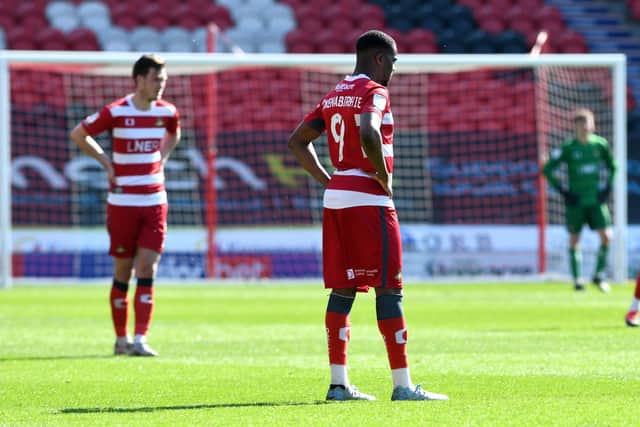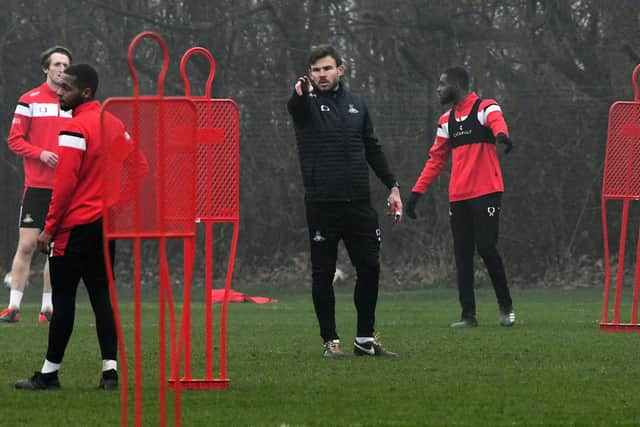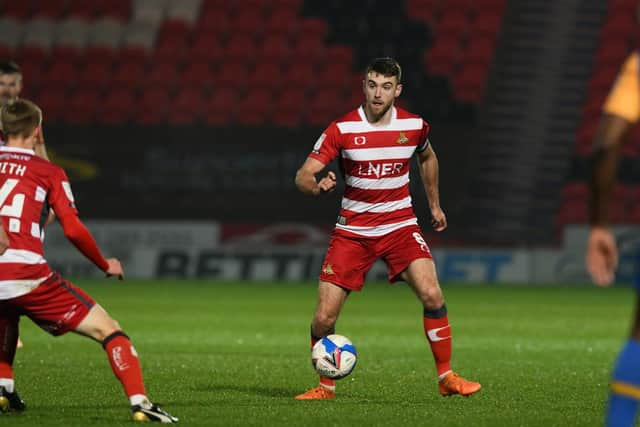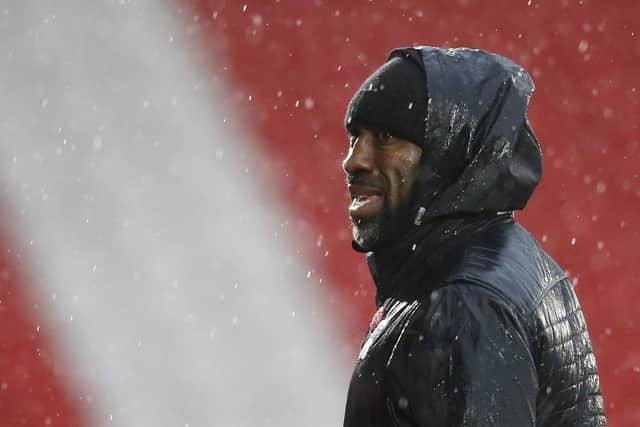How? The story behind Doncaster Rovers' collapse from promotion chasers to mid-table mediocrity
and live on Freeview channel 276
How did they get relegated from the Championship in 2014?
How did they get relegated from League One in 2016?
How did not they not win the League Two title in 2017?


And now, how did they fail to secure, at the very minimum, a place in the play-offs in 2021?
In all those cases, Rovers have seen positions of strength eroded away to leave them only with disappointment and frustration.
Advertisement
Hide AdAdvertisement
Hide AdBut never before had so much promise amounted to so little as it did this year.
Within touching distance of the summit of League One at the start of February, they finished the campaign in 14th place, 25 points off the top and ten off the play-offs.


From automatic promotion form to relegation form, ensuring a magnificent campaign became a maddeningly mediocre one.
So the question is simple - how?
Two big departures from the club midway through the season will be pointed to as being particularly significant. And they were.
Advertisement
Hide AdAdvertisement
Hide AdBut the level to which they were the source of, or major influence on, the decline is debatable.


The departure of a manager midway through a campaign is always likely to provide some disruption.
Initially though, it appeared Rovers had recovered well and quickly from Darren Moore jumping ship to Sheffield Wednesday at the start of March - and not just because they won their first two games under Andy Butler with a good deal of control.
There was a genuine vibrancy around the club from the morning on which Moore’s departure was confirmed, including a sense of relief.
Advertisement
Hide AdAdvertisement
Hide AdMultiple players had grown weary of some of Moore’s traits, particularly when it came to timekeeping, and schedules and plans not being made entirely clear.


Butler quickly brought those on the fringes closer to the core, and there was an appreciation of that. He instituted after-game training sessions for those not involved in matches, ensuring fringe players were not obliged to come into Cantley Park on days when others would be off.
But the harmony would not last, and it is here where Moore’s departure played a significant role.
Wednesday had been sending people to watch Rovers games for around two months before they made any form of approach to Moore.
Advertisement
Hide AdAdvertisement
Hide AdThough rumours began to circulate at the turn of the year, privately he insisted there was no substance in the Hillsborough link.
And he took the same stance when asked whether he would be sticking with Rovers by some of the players he was seeking to sign in January.
His assurances that he was going nowhere would ultimately cause discontent among those who had recently joined the club, particularly those who were attracted chiefly by Moore’s presence.
There was some sulking going on, and an eagerness to share that unhappiness would cause friction with longer serving players keen to just get on with the job.
Advertisement
Hide AdAdvertisement
Hide AdBut at the same time, issues that had been bubbling under the surface started to come to the fore.
The prevailing feeling is that there was not enough foresight with recruitment, leaving Rovers with a squad not suited to the rigours of this particular season.
And there are genuine questions over whether Rovers would have avoided a similar decline even if Moore had remained in place.
Using the budget at his disposal as he saw fit, Moore had prioritised youthful potential when it came to bolstering his squad in the summer. He undoubtedly added quality to the group with the crop of loanees an improvement on the previous year.
Advertisement
Hide AdAdvertisement
Hide AdThat took Rovers a long way in the first half of the season, particularly once issues with the approach within matches were ironed out.
But when push came to shove in the second half of the campaign, with no let up in a packed schedule, inexperienced legs grew weary.
Taylor Richards himself highlighted recently that the most games in a single season he had previously played was 14. He finished the campaign having made 48.
He was far from the only one.
Those with little senior experience were not prepared for demands of a compressed season and it told in performances, both individually and as part of the collective.
Advertisement
Hide AdAdvertisement
Hide AdThere is always the chance of inconsistency with young players making their first real steps into full time senior football. The demands of this season only increased the likelihood.
January recruitment far from solved the issue. It exacerbated it.
Moore bolstered his squad with more youthful, inexperienced additions in the form of Elliot Simoes and Scott Robertson.
And when he did break from the typical demographic of a Moore signing, he hardly solved the core issue.
Advertisement
Hide AdAdvertisement
Hide AdBoth John Bostock and Omar Bogle had hardly been playing regular football prior to their arrivals at the club. Yet, they were looked upon and expected to give Rovers fresh drive through an incredibly intense period.
Bostock in particular was expected to fill the shoes of Ben Whiteman, which would have been a hugely ambitious task for anyone, given the significance to Rovers of the departing skipper.
It became clear just how important Whiteman had been for Rovers in the first half of the season.
The midfielder was the complete package. His passing range, confidence and quality on the ball was unmatched. His movement, both in attacking and defensive terms, was exceptional. His engine was unquestionable.
Advertisement
Hide AdAdvertisement
Hide AdAnd he was a born leader, a vocal presence in the middle of the park that assured those around them and demanded high standards. Rovers certainly lacked that in his absence.
So much of Rovers’ play went through him, and it fell to a rotating cast of characters to pick up the mantle once he joined Preston North End.
It needed a collective effort within each starting XI to cover Whiteman’s role. It was always unlikely that one individual could do the lot.
Bostock was looked upon as the one who could take up the technical responsibility, given his undoubted quality in possession.
Advertisement
Hide AdAdvertisement
Hide AdBut stepping into Whiteman’s place would be particularly difficult for a player who had barely kicked a ball in a competitive setting for 18 months prior to his arrival and had been without a club for the previous four.
The injury list in the second half of the season reflected just how ill-prepared some members of the squad were.
Bostock and Bogle were seemingly getting up to speed when injuries halted their progress and, in performance terms, they would never recover.
Youngsters too were afflicted, either spending time on the sidelines or being unable to start consistently as they carried niggles that prevented them from reaching peak performance.
This brought further fractures in the camp.
Advertisement
Hide AdAdvertisement
Hide AdThose longer serving players with Rovers at their heart looked at relative newcomers and questioned their commitment, particularly in the wake of lacklustre performances which led to the poor results.
At a point it seemed as though they were heading towards an irreparable split between the core and ‘Moore’s men.’
The situation grew heated, with the hapless defeat to lowly Wigan Athletic at the Keepmoat in April proving to be the straw that broke the camel’s back.
There were fiery scenes in the changing room afterwards, with various accusations thrown around, including that some players were more focused on outside activities than getting things right on the pitch.
Advertisement
Hide AdAdvertisement
Hide AdHindsight and more clarity of thinking did see tensions ease towards the end of the season, with an acceptance that commitment was not the main issue, but conditioning probably was.
That hardly aided the cause of Butler, whose squad was weakening before his very eyes.
Whatever you think of how he handled the situation, it cannot be denied that he was dealt an awful hand over the course of his two-and-a-half months in charge.
Rovers appointed Butler chiefly because it had always been the plan.
Advertisement
Hide AdAdvertisement
Hide AdWhen Butler re-joined the club as a player in September last year, there was more push for it to happen from the club hierarchy than team management.
As it was, the veteran centre half grasped his opportunity to play with both hands and made himself undroppable long before Moore’s departure.
Off the pitch, Butler had impressed with his coaching and management style as he transformed the Belles into a much more professional outfit than they had been for years.
And with that, he had moved himself into position for the board to call upon should Moore depart - as they expected he eventually would given his standing and reputation in the game, plus the work of his eager representatives.
Advertisement
Hide AdAdvertisement
Hide AdBefore his appointment and through the early stages of his management, senior players were consulted on whether Rovers were making the right decision with Butler.
The messages back were adamant that due to unhappiness within the squad and the fragile conditioning of players, bringing in a new manager would not solve the problems that were impacting upon form.
However, it is hard not to look at Butler’s reluctance to add to his coaching staff as a potential flaw, particularly given his lack of experience in the top job.
His reasoning was that he did not believe someone new would have a big enough impact due to the lack of time on the training ground the schedule afforded. And he possessed a great deal of faith in the existing coaching staff abilities to step up, which they did admirably.
Advertisement
Hide AdAdvertisement
Hide AdBut a fresh pair of eyes may indeed have made a tangible difference - as much on Butler as anything else. Someone to point out things he may not have spotted, or to advise him on how to approach a difficult situation.
Finding such a person, particularly one Butler could trust and would be comfortable working with, may not have been the easiest task, certainly at short notice.
How much it would have made a difference, we will never know.
The impact on performances by the composition of the squad was seemingly inevitable, and it exposed the fine margins on which Rovers’ success in the first half of the campaign were built.
Advertisement
Hide AdAdvertisement
Hide AdRarely had they blown teams away or thoroughly dominated games of football.
By the turn of the year, they were relying heavily on gargantuan defensive performances and threat on the counter to see them through to victories.
Once legs grew tired and their collective ability to run through brick walls waned, Rovers became average and the results reflected so. This began several weeks before Moore headed down the M18.
As the search for victories under Butler drew on, the psychological impact only grew.
Advertisement
Hide AdAdvertisement
Hide AdThere were points when confidence was completely shot and the fight drained out of the group as their grip on a top six spot weakened.
Defeat at lowly Bristol Rovers on Easter Monday, and particularly the manner of it, was a hammerblow to the faith that they could reignite their play-off push.
The season petered out in lacklustre fashion, washing away all that had been built in the first half.
But as it did, it proved the foundations on which the successes of the campaign had been built were not so solid afterall.
Advertisement
Hide AdAdvertisement
Hide AdLessons must be learned to ensure such levels of head-scratching when asking ‘how’ do not come around again.
*
In these confusing and worrying times, local journalism is more vital than ever. Thanks to everyone who helps us ask the questions that matter by taking out a subscription or buying a paper. We stand together. Liam Hoden, editor.
Comment Guidelines
National World encourages reader discussion on our stories. User feedback, insights and back-and-forth exchanges add a rich layer of context to reporting. Please review our Community Guidelines before commenting.